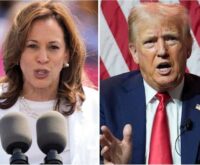By CHARLES BABINGTON
Associated Press
KISSIMMEE, Florida (AP) _ President Barack Obama has a problem with Florida’s important Puerto Rican voters, and it has little to do with the immigration and deportation issues that dominate so much of the national debate involving Hispanic voters.
Florida’s two biggest Hispanic groups — Puerto Ricans and Cuban Americans — have legal statuses not enjoyed by immigrants from other Latin American countries. This makes illegal immigration a tangential issue for them.
Their chief concerns center on Florida’s struggling economy, leaders of both parties say. And Florida’s high unemployment and foreclosure rates have hit Puerto Ricans hard.
That’s a dilemma for Obama. He’s counting on big Puerto Rican support to help offset Cuban-American precincts, mainly in Miami, where Republican Mitt Romney expects to do well. Some analysts say he may fall short.
“The Puerto Rican vote is going for Obama,” said Florida-based pollster Brad Coker. “But I don’t think it’s going by the same margin” as in 2008.
More than 1.5 million Hispanics are registered to vote in Florida, nearly 14 percent of the state total. About 592,000 are registered Democrats, and 463,000 are Republicans.
Obama’s team is working hard to get Puerto Ricans to the polls. Along with the Spanish-language ads on TV and radio, the campaign is organizing raucous caravans with decorated car windows and loud speakers on trucks, a tradition in Puerto Rico elections.
“The issue is, can we motivate the base for a huge turnout,” said Bill Richardson, a Latino and former New Mexico governor, as he helped organize a caravan Friday in a heavily Hispanic Orlando neighborhood. Early reports are good, he said, “but we have to drag them out, like we’re doing here in this caravan, to motivate early voters.”
Richardson, who briefly ran for president in 2008, said Hispanics’ enthusiasm for Obama was lagging earlier this year. He thinks that changed in June, when Obama announced that about 800,000 young illegal immigrants with no criminal records could legally stay in the country.
“What has brought the Hispanic community enthusiastically back to the president has been his decision to halt the deportations,” Richardson said.
Others are less sure. Dario Moreno, a political scientist at Florida International University, noted that Puerto Ricans and Cubans “don’t have an immigration problem.”
Puerto Ricans are U.S. citizens, and can vote for president if they live in a state or Washington, D.C. Cuban immigrants have special legal standing that stems from the United States’ long-running tension with the Castro government.
Moreno said Puerto Ricans and Cuban Americans take umbrage if political rhetoric reaches into emotional areas. He cited instances in 2008, when some Republican candidates said America was “losing its culture” because so many residents speak Spanish. Puerto Ricans and others see that “as not only anti-immigrant, but anti-Latino,” he said.
There have been few such over-the-line remarks in this election, Moreno said. Even when Romney suggested illegal immigrants “self deport,” it didn’t resonate much with Florida’s Puerto Ricans and Cuban descendants, Moreno said.
Kelvin Soto, a Kissimmee lawyer who largely grew up in Puerto Rico, agrees that Romney “has done a very good job” of toning down contentious comments from the Republican primary, such as when he criticized Texas’ policy of granting lower in-state college tuition to illegal immigrants. What most of his Hispanic friends recall, Soto said, is that Romney has promised to create 12 million jobs.
“People don’t want to investigate it, because they fear it might not be true,” said Soto, an Osceola County school board candidate who was campaigning Saturday at an early voting site.
Calvin Gutierrez, 18, said most of his friends support Obama, “but the economic situation has gotten worse,” and many are unenthusiastic. “There are a few who have stopped supporting him,” although they’re unlikely to vote for Romney, said Gutierrez, a college freshman hoping to go into medicine.
Two former Florida Republican governors, Bob Martinez and Jeb Bush, said in interviews Saturday that Romney is making good inroads among Hispanics, including Puerto Ricans. They said these voters question why Obama didn’t push for immigration reform when Democrats controlled Congress in his first two years as president, Bush said.
Martinez, a Tampa native whose ancestors came from Spain, said “Hispanic” covers a wide array of Floridians with ties to Cuba, Puerto Rico, Venezuela, Mexico and other places. They have different traditions, needs and motivations, he said, and no one-size-fits-all campaign approach will work.
Many Latinos work in the hard-hit construction and landscaping industries, he said. “The common denominator for everybody is the economy,” Martinez said. “There’s a passion in this election I’ve not seen in a long time,” he said, and Romney is benefiting.
Christina Martinez, 42, is a Puerto Rican Floridian sticking with Obama. He deserves more time to heal the economy she said as she waited to vote in Kissimmee on Saturday, the last day of early voting in Florida.
Martinez has four daughters and one grandson, and she doesn’t like Romney’s record on women’s rights, health care, education or the economy. As for Obama, she said, “I think he did great.”
Martinez and others who live in struggling, largely Spanish-speaking communities may tip the balance for or against Obama in this, the biggest tossup state of all.
___
Follow Charles Babington on Twitter: https://twitter.com/cbabington.









